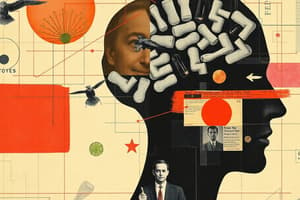Podcast
Questions and Answers
Which part of the central nervous system is responsible for voluntary acts?
Which part of the central nervous system is responsible for voluntary acts?
- Cerebellum
- Cerebrum
- Nerves (neurotransmitters) (correct)
- Brain stem
Which neurotransmitter is primarily associated with the fight-or-flight response?
Which neurotransmitter is primarily associated with the fight-or-flight response?
- Epinephrine (correct)
- Dopamine
- Serotonin
- GABA
Which neurotransmitter is primarily inhibitory and involved in modulating other neurotransmitters?
Which neurotransmitter is primarily inhibitory and involved in modulating other neurotransmitters?
- Glutamate
- Serotonin
- GABA (correct)
- Acetylcholine
An excess of which of the following neurotransmitters is most closely associated with schizophrenia and mania?
An excess of which of the following neurotransmitters is most closely associated with schizophrenia and mania?
A deficiency in which neurotransmitter is most closely linked to Alzheimer's disease?
A deficiency in which neurotransmitter is most closely linked to Alzheimer's disease?
Considering the role of neurotransmitters, which of the following medication actions would be most effective in treating anxiety disorders?
Considering the role of neurotransmitters, which of the following medication actions would be most effective in treating anxiety disorders?
If a patient exhibits symptoms of both depression AND anxiety, which of the following neurotransmitter imbalances could be contributing to BOTH conditions?
If a patient exhibits symptoms of both depression AND anxiety, which of the following neurotransmitter imbalances could be contributing to BOTH conditions?
Which defense mechanism is characterized by redirecting intense feelings towards a less threatening target?
Which defense mechanism is characterized by redirecting intense feelings towards a less threatening target?
A person who focuses on the technical details of a serious car accident they were involved in, while showing no emotional expression, is most likely employing which defense mechanism?
A person who focuses on the technical details of a serious car accident they were involved in, while showing no emotional expression, is most likely employing which defense mechanism?
Amnesia following a traumatic event, preventing recall of the event, is an example of which defense mechanism?
Amnesia following a traumatic event, preventing recall of the event, is an example of which defense mechanism?
Which scenario BEST exemplifies the defense mechanism of denial?
Which scenario BEST exemplifies the defense mechanism of denial?
An individual's persistent lack of clear identity as an adult, stemming from an unresolved developmental stage, exemplifies which defense mechanism?
An individual's persistent lack of clear identity as an adult, stemming from an unresolved developmental stage, exemplifies which defense mechanism?
Which of the following mental illnesses has NOT been supported by twin studies as having a genetic vulnerability?
Which of the following mental illnesses has NOT been supported by twin studies as having a genetic vulnerability?
Adoption studies can provide insight into the relationship between genetics and environment in the development of psychiatric disorders. Which type of adoption study is described by the comparison of monozygotic twins reared apart by different adoptive parents?
Adoption studies can provide insight into the relationship between genetics and environment in the development of psychiatric disorders. Which type of adoption study is described by the comparison of monozygotic twins reared apart by different adoptive parents?
Which of the following is the MOST accurate description of the 'id' according to Freudian psychoanalytic theory?
Which of the following is the MOST accurate description of the 'id' according to Freudian psychoanalytic theory?
Which of the following theorists is best known for their contributions to developmental theory?
Which of the following theorists is best known for their contributions to developmental theory?
What is psychoimmunology?
What is psychoimmunology?
According to Freudian theory, which component of the personality operates on the 'reality principle'?
According to Freudian theory, which component of the personality operates on the 'reality principle'?
Elevated levels of which biological marker, when unresolved, are MOST associated with psychoimmunological factors in mental illness?
Elevated levels of which biological marker, when unresolved, are MOST associated with psychoimmunological factors in mental illness?
Which neurobiologic cause of mental illness is evaluated using CT SCAN, MAGNETIC RESONANCE IMAGING, and PET SCAN?
Which neurobiologic cause of mental illness is evaluated using CT SCAN, MAGNETIC RESONANCE IMAGING, and PET SCAN?
Suppose a researcher is conducting an adoption study focusing on the genetic links to schizophrenia. They identify a set of adopted individuals, all diagnosed with schizophrenia. To BEST differentiate genetic versus environmental contributions, which comparison group would provide the MOST valuable insights?
Suppose a researcher is conducting an adoption study focusing on the genetic links to schizophrenia. They identify a set of adopted individuals, all diagnosed with schizophrenia. To BEST differentiate genetic versus environmental contributions, which comparison group would provide the MOST valuable insights?
During the Initiative vs. Guilt stage, what might a child say that demonstrates a successful resolution of this psychosocial crisis?
During the Initiative vs. Guilt stage, what might a child say that demonstrates a successful resolution of this psychosocial crisis?
Which of the following statements exemplifies the successful resolution of the Industry vs. Inferiority stage?
Which of the following statements exemplifies the successful resolution of the Industry vs. Inferiority stage?
Which of the following reflects an unsuccessful resolution of the Identity vs. Role Confusion stage?
Which of the following reflects an unsuccessful resolution of the Identity vs. Role Confusion stage?
What statement indicates a successful resolution of the Intimacy vs. Isolation stage?
What statement indicates a successful resolution of the Intimacy vs. Isolation stage?
Which statement is indicative of an unsuccessful resolution of the Generativity vs. Self-Absorption stage?
Which statement is indicative of an unsuccessful resolution of the Generativity vs. Self-Absorption stage?
A person nearing the end of their life says, 'I’ve led a happy, productive life, and I still have plenty to give.' Which psychosocial crisis has this person successfully resolved?
A person nearing the end of their life says, 'I’ve led a happy, productive life, and I still have plenty to give.' Which psychosocial crisis has this person successfully resolved?
According to Piaget, what is a key developmental milestone during the sensorimotor stage?
According to Piaget, what is a key developmental milestone during the sensorimotor stage?
How might a child in the sensorimotor stage demonstrate an understanding of object permanence?
How might a child in the sensorimotor stage demonstrate an understanding of object permanence?
Which of Erikson's psychosocial stages is most closely associated with the virtue of 'fidelity'?
Which of Erikson's psychosocial stages is most closely associated with the virtue of 'fidelity'?
A 5-year-old consistently avoids group activities, expressing fear that their contributions will be deemed inadequate. According to Erikson, which of the following parental behaviors would MOST likely exacerbate these feelings?
A 5-year-old consistently avoids group activities, expressing fear that their contributions will be deemed inadequate. According to Erikson, which of the following parental behaviors would MOST likely exacerbate these feelings?
Which cognitive development milestone is typically associated with the preoperational stage?
Which cognitive development milestone is typically associated with the preoperational stage?
A child in the concrete operational stage is MOST likely to demonstrate which type of reasoning?
A child in the concrete operational stage is MOST likely to demonstrate which type of reasoning?
What differentiates formal operational thinking from concrete operational thinking?
What differentiates formal operational thinking from concrete operational thinking?
According to Maslow's Hierarchy of Needs, understanding a client's motivations during a life crisis is MOST relevant to which aspect of nursing care?
According to Maslow's Hierarchy of Needs, understanding a client's motivations during a life crisis is MOST relevant to which aspect of nursing care?
In classical conditioning, what is the role of a neutral stimulus?
In classical conditioning, what is the role of a neutral stimulus?
Which scenario BEST exemplifies operant conditioning?
Which scenario BEST exemplifies operant conditioning?
What is the primary difference between classical and operant conditioning?
What is the primary difference between classical and operant conditioning?
A person who consistently makes up excuses for being late to work might be using which defense mechanism?
A person who consistently makes up excuses for being late to work might be using which defense mechanism?
A high school student who struggles academically dedicates himself to becoming an exceptional athlete. This behavior is MOST indicative of which ego defense mechanism?
A high school student who struggles academically dedicates himself to becoming an exceptional athlete. This behavior is MOST indicative of which ego defense mechanism?
Which of the following scenarios represents an individual MOST likely utilizing the defense mechanism of conversion?
Which of the following scenarios represents an individual MOST likely utilizing the defense mechanism of conversion?
Flashcards
Central Nervous System
Central Nervous System
The brain, spinal cord, and nerves that control voluntary acts. Relies on neurotransmitters.
Neurotransmitters
Neurotransmitters
Chemicals that facilitate communication between nerve cells in the brain.
Dopamine
Dopamine
Affects complex movements, motivation, cognition and mood.
Norepinephrine
Norepinephrine
Signup and view all the flashcards
Serotonin
Serotonin
Signup and view all the flashcards
GABA
GABA
Signup and view all the flashcards
Genetics and Mental Illness
Genetics and Mental Illness
Signup and view all the flashcards
Psychoimmunology
Psychoimmunology
Signup and view all the flashcards
Infections & Mental Illness
Infections & Mental Illness
Signup and view all the flashcards
Twin Studies in Genetics
Twin Studies in Genetics
Signup and view all the flashcards
Adoption Studies
Adoption Studies
Signup and view all the flashcards
Elevated Cytokines
Elevated Cytokines
Signup and view all the flashcards
Toxoplasma Gondii
Toxoplasma Gondii
Signup and view all the flashcards
Freud's Determinism
Freud's Determinism
Signup and view all the flashcards
Id (in psychoanalysis)
Id (in psychoanalysis)
Signup and view all the flashcards
Ego (in psychoanalysis)
Ego (in psychoanalysis)
Signup and view all the flashcards
Denial
Denial
Signup and view all the flashcards
Displacement
Displacement
Signup and view all the flashcards
Dissociation
Dissociation
Signup and view all the flashcards
Fixation
Fixation
Signup and view all the flashcards
Intellectualization
Intellectualization
Signup and view all the flashcards
Preoperational Stage
Preoperational Stage
Signup and view all the flashcards
Concrete Operational Stage
Concrete Operational Stage
Signup and view all the flashcards
Formal Operations Stage
Formal Operations Stage
Signup and view all the flashcards
Maslow's Hierarchy Significance
Maslow's Hierarchy Significance
Signup and view all the flashcards
Classical Conditioning
Classical Conditioning
Signup and view all the flashcards
Operant Conditioning
Operant Conditioning
Signup and view all the flashcards
Ego Defense Mechanisms
Ego Defense Mechanisms
Signup and view all the flashcards
Compensation (Defense Mechanism)
Compensation (Defense Mechanism)
Signup and view all the flashcards
Conversion (Defense Mechanism)
Conversion (Defense Mechanism)
Signup and view all the flashcards
Operant Conditioning
Operant Conditioning
Signup and view all the flashcards
Initiative vs. Guilt
Initiative vs. Guilt
Signup and view all the flashcards
Industry vs. Inferiority
Industry vs. Inferiority
Signup and view all the flashcards
Generativity
Generativity
Signup and view all the flashcards
Identity vs. Role Confusion
Identity vs. Role Confusion
Signup and view all the flashcards
Intimacy vs. Isolation
Intimacy vs. Isolation
Signup and view all the flashcards
Integrity vs. Despair
Integrity vs. Despair
Signup and view all the flashcards
Sensorimotor Stage
Sensorimotor Stage
Signup and view all the flashcards
Object Permanence
Object Permanence
Signup and view all the flashcards
Intimacy
Intimacy
Signup and view all the flashcards
Unsuccessful Initiative vs. Guilt
Unsuccessful Initiative vs. Guilt
Signup and view all the flashcards
Study Notes
Neurobiologic Theories
- The central nervous system consists of the brain and the nerves that control voluntary acts.
- Brain components include the cerebrum, cerebellum, brain stem, and limbic system.
Neurotransmitters
- Neurotransmitters facilitate neurotransmission.
- They are important to relay messages in the right proportions.
- Studies show neurotransmitter variations in the brains of people with some mental disorders.
- Neurotransmitters play a role in psychiatric illness and psychotropic medications, including actions and side effects
Excitatory Neurotransmitters:
- Dopamine helps complex movements, motivation, cognition, and mood.
- Norepinephrine triggers fight or flight, mood regulation, cognition, memory, sleep, and wakefulness.
- Epinephrine produces fight-or-flight response.
- Glutamate has neurotoxic effects at high levels, and affects learning and memory.
Inhibitory Neurotransmitters:
- Serotonin regulates mood, food intake, sleep, wakefulness, temperature, pain control, and sexual behaviors.
- Gamma-aminobutyric acid (GABA) is a major inhibitory neurotransmitter, which modulates other neurotransmitters.
- Acetylcholine affects the sleep-and-wakefulness cycle, and signals muscles to become alert.
- Histamine and neuropeptides are also neuromodulators.
Neurotransmitter Imbalances
- Increased dopamine levels are associated with schizophrenia, mania, and addiction.
- Decreased dopamine levels are associated with depression, Parkinson's disease, and ADHD.
- Increased norepinephrine is associated with schizophrenia, mania, and anxiety.
- Decreased norepinephrine is associated with depression, social withdrawal, and memory loss.
- Increased serotonin is associated with schizophrenia and anxiety.
- Decreased serotonin is associated with depression.
- Increased acetylcholine is associated with depression.
- Decreased acetylcholine is associated with Alzheimer's disease, Huntington's, and Parkinson's.
- Increased glutamate is associated with depression, anxiety, Huntington's, and Alzheimer's disease.
- Decreased glutamate is associated with schizophrenia.
- Decreased GABA is associated with schizophrenia, anxiety, and Huntington's.
- Medications that increase GABA function treat anxiety and also induce sleep.
Neurobiologic Causes of Mental Illness
- Genetics and heredity play role in mental illness, along with non-genetic factors.
- Twin, adoption, and family studies are used to study the role of genetics and heredity
Twin Studies
- Twin studies compare the rates of certain mental illnesses between identical and fraternal twins.
- Genetic vulnerability is supported in autism, PTSD, substance abuse (alcoholism), schizophrenia, bipolar disorder, major depression, OCD, and risk for suicide.
Adoption Studies
- Adoption studies compare genetics and environment in development of a psychiatric disorder.
- Studies involve adopted children whose:
- Biological parents had/adoptive parents didn't have a psychiatric disorder.
- Adoptive parents had/biological parents didn't have a psychiatric disorder.
- Biological and adoptive relatives of adopted children developed a psychiatric disorder.
- Monozygotic twins were raised apart by different adoptive parents.
- Possible genetic links include alcoholism, schizophrenia, major depression, bipolar disorder, ADHD, and antisocial personality disorder.
Infections
- Infections may alter human genes or occur during fetal development.
- Unresolved elevated cytokines
- Toxoplasma gondii is associated with schizophrenia, bipolar disorder, and suicidal/aggressive behaviors.
Brain imaging techniques include:
- CT Scan
- Magnetic Resonance Imaging
- PET Scan
Psychopathologic Theories
- Theories to consider are psychoanalytic (Freud), developmental (Erikson, Piaget), interpersonal (Peplau), humanistic (Maslow), and behavioral (Pavlov, Skinner).
Psychoanalytic Theory (Sigmund Freud)
- All human behavior is caused and explainable.
- The personality has three components.
- Id is the source of instincts.
- Ego is the sense of reality.
- Superego is morality.
- Freud believed that behavior is motivated by subconscious thoughts and feelings.
- Conscious thoughts are those a person is aware of.
- Preconscious thoughts are just below the surface.
- Unconscious thoughts are those outside of awareness.
- Dream analysis and ego defense mechanisms
- Oral, anal, phallic/Oedipal, latency, and genital are the psychosexual stages of development.
- Patients may experience transference and countertransference.
- Transference is when the patient displaces feelings to nurse
- Countertransference is when the nurse displaces feelings to patient
Developmental Theory (Erik Erikson)
- Focuses on stages of psychosocial development
Developmental Theory (Jean Piaget)
- Focuses on cognitive stages of development
Humanistic Theory (Abraham Maslow)
- Maslow's theory helps nurses understand how clients' motivations and behaviors change during life crises.
- The hierarchy of needs includes physiologic needs, safety and security, love and belonging, esteem, and self-actualization.
Behavioral Theories
- Classical conditioning (Ivan Pavlov).
- Operant conditioning (B.F. Skinner).
Ego Defense Mechanisms
- Ego defense mechanisms use methods of attempting to protect the self and cope with basic drives or emotionally painful thoughts, feelings, or events.
- Compensation is overachievement in one area to offset real or perceived deficiencies in another.
- An example is Napoleon complex or the student who excels to compensate for feelings of loneliness.
- Conversion expresses an emotional conflict through development of a physical symptom, usually sensorimotor in nature.
- An example is a man becomes blind after seeing his wife enter a hotel room with another man.
- Denial fails to acknowledge an unbearable condition, or admit the reality of a situation, and is common in alcoholics.
- An example is reacting to the recent death of a loved one by saying "No, I don't believe you."
- Displacement is ventilation of intense feelings toward persons less threatening than the one who aroused those feelings.
- An example is person who is mad at the boss yells at their spouse
- Dissociation deals with emotional conflict by a temporary alteration in consciousness or identity, with a short-lived gap in consciousness
- An art student mentally separating herself from a noisy environment as she becomes absorbed in her work
- Fixation results in immobilization of a portion of the personality resulting from unsuccessful completion of tasks in a developmental stage.
- An example is never learning to delay gratification
- Intellectualization separates the emotions of a painful event or situation from the facts involved, acknowledging the facts but not the emotions.
- An example is person shows no emotional expression when discussing serious car accident and focus on the technical details of the accident
- Identification models actions and opinions of influential others while searching for identity or aspiring to reach a personal, social, or occupational goal.
- An example is a nursing student becoming is inspired to become a critical care nurse because that that is the specialty of the instructor who they admire
- Introjection accepts another person's attitudes, beliefs, and values as one's own.
- An example is a child is told by his mother that he is an idiot and will not go to college will still pass the entrance exam
- Projection is unconscious blaming of unacceptable inclinations or thoughts on an external object
- An example is Man who has thought about same-gender sexual relationship but never had one beats a man who is gay
- Rationalization excuses own behavior to avoid guilt, responsibility, conflict, anxiety, or loss of self-respect.
- An example is student blames failure on teacher being mean
- Reaction formation acts the opposite of what one thinks or feels.
- An example is person who despises the boss tells everyone what a great boss they are
- Regression is moving back to a previous developmental stage to feel safe or have needs met.
- An example is Adult pouts like a 4-year-old if they are not the center of their partner's attention
- Repression excludes emotionally painful or anxiety-provoking thoughts and feelings from conscious awareness. It's a an unconscious exclusion
- An example is Person has no memory of the mugging they suffered yesterday
- Suppression is conscious of the exclusion unacceptable thoughts and feelings from conscious awareness
- As an example, studnt decides not to think about a parenyt's illness to study for a test
- Resistance is overt or covert antagonism toward remembering or processing anxiety-producing information.
- An example is person who is in therapy who has experienced significant trauma might resist discussing certain events or feelings at first.
- Sublimation substitutes a socially acceptable activity for an impulse that is unacceptable.
- An example is person who has quit smoking sucks on hard candy when they are overcome by the urge to to do smoke
- Substitution replaceing the desired gratification with one that is mor eadily available
- An example a person who would like to have their own children opens a day care center
- Undoing exhibits acceptable acceptable behavior to make up for or negate unacceptable behavior
- An exampl eof whic is, person who is engaging in a ritualistic pattern of undoing that reinforces obsessive thinking and compulsive behaviors
- Splitting is inability of integrate the positive and negative qualities of oneself or others into a cohesive image.
- An example of which is, A 26 year old who initially values an aquaintance only to become distillusioned later on when they turn out to be flawed
Studying That Suits You
Use AI to generate personalized quizzes and flashcards to suit your learning preferences.




